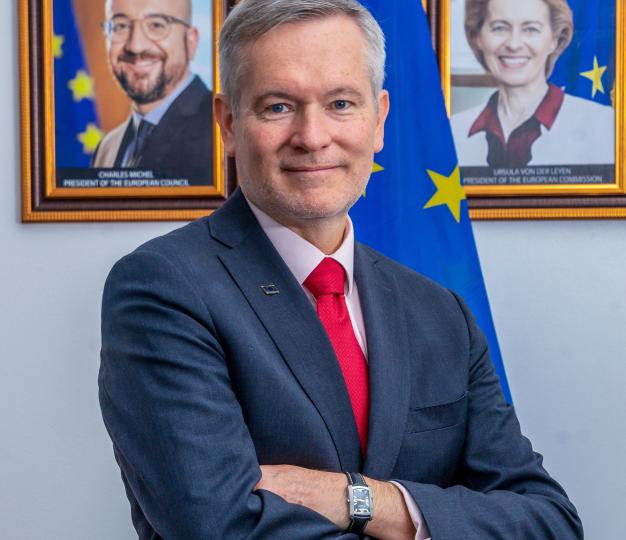In a passionate call to action, the European Union (EU) has urged Nigeria’s Ministries, Departments, and Agencies to ensure the effective implementation of the National Disability Act. This Act, designed to safeguard the rights and promote the welfare of over 35 million Nigerians with disabilities, has faced significant challenges in achieving its intended impact.
The EU’s appeal came during a high-level national dialogue held in Abuja to commemorate this year’s International Day of Persons with Disabilities. Themed “Transformative Solutions to Disability-Inclusive Development in Nigeria,” the event was spearheaded by the National Commission for Persons with Disabilities (NCPWD) and the Federal Ministry of Humanitarian Affairs and Poverty Alleviation. With support from the EU through its Rule of Law and Anti-Corruption (RoLAC) Programme, implemented by the International Institute for Democracy and Electoral Assistance (IDEA), the dialogue provided a platform to examine Nigeria’s strides and setbacks in disability inclusion.
A Wake-Up Call for Inclusion
Speaking on behalf of the EU Ambassador-Designate to Nigeria, Guartier Mignot, the Head of the Governance, Security, and Migration Section at the EU Delegation to Nigeria and ECOWAS, Ruben Alba Aguilera, expressed deep concern over the marginalization of persons with disabilities in national development initiatives.
“People with disabilities are being left behind in development,” Aguilera lamented. “Despite commitments to inclusion under the UN Convention on the Rights of Persons with Disabilities, many interventions in Nigeria fail to integrate the needs of this demographic. Societal barriers continue to place persons with disabilities at a severe disadvantage, subjecting them to violence, poverty, poorer health outcomes, and limited access to education and employment. This is not inevitable; we must act deliberately to ensure disability inclusion.”
Aguilera underscored the dire statistics: 9 out of 10 Nigerians with disabilities live below the poverty line. “These individuals face daily struggles, and it is our collective responsibility to address their challenges,” he said, adding that passing the Disability Rights Law was a commendable first step but far from sufficient without concrete action.
Legislation Without Implementation: A Growing Concern
The National Disability Act, hailed as a milestone when passed, mandates equal rights and access to education, employment, healthcare, and public spaces for persons with disabilities. However, Aguilera warned that a law is only as effective as its implementation. “We cannot rest on our laurels; it is time to dedicate sufficient resources and ensure the law translates into tangible benefits for those it seeks to protect,” he urged.
Prof. Nentawe Yilwatda, Minister of Humanitarian Affairs and Poverty Reduction, represented by Sunday Hezekiah, Director of the Special Needs Department, echoed Aguilera’s sentiments. Yilwatda acknowledged the funding challenges that hinder the execution of disability-related projects, describing resources allocated by the National Assembly as “grossly inadequate.”
“The Act promises education, welfare, and support for persons with disabilities, but the financial commitment must match these ambitions,” Yilwatda remarked.
Leadership and Accountability in Focus
Ayuba Gufwan, the Executive Secretary of the NCPWD, used the occasion to emphasize the importance of leadership and accountability in driving disability inclusion. “Today is a day for stocktaking: where are we coming from, where are we now, and where are we heading?” Gufwan asked, challenging stakeholders to assess their contributions toward an inclusive society.
Abba Isa, Senior Special Assistant to the President on Special Needs and Equal Opportunities, stressed the need for collaboration among policymakers, civil society organizations, and development partners. “Awareness is key,” Isa declared. “Ignorance of the law is no excuse; we must act now to bridge the gap between policy and practice.”
The Role of International Partners
The EU reaffirmed its commitment to disability inclusion through international partnerships and interventions in Nigeria. Aguilera highlighted the EU’s focus on fostering equity and inclusion, noting that sustainable development cannot be achieved without addressing the needs of persons with disabilities.
Danladi Plang, Head of Programme for the RoLAC initiative, echoed this perspective, emphasizing that disability inclusion is a non-negotiable component of sustainable development. “Integrating the needs of persons with disabilities in planning and programming is essential for achieving long-term growth and equity,” he said.
A Call to Action
As the dialogue drew to a close, the message was clear: the time for deliberation is over; Nigeria must act decisively to implement the National Disability Act. The participants called for increased funding, heightened awareness, and stronger collaboration among stakeholders to ensure that persons with disabilities are no longer left behind.
Aguilera’s words resonated powerfully: “A society’s greatness is measured by how it treats its most vulnerable members. Nigeria has the laws in place; now, it must deliver on its promises.”
The dialogue ended with a renewed commitment to prioritize the welfare and inclusion of persons with disabilities, setting the stage for a more equitable future in Nigeria.


